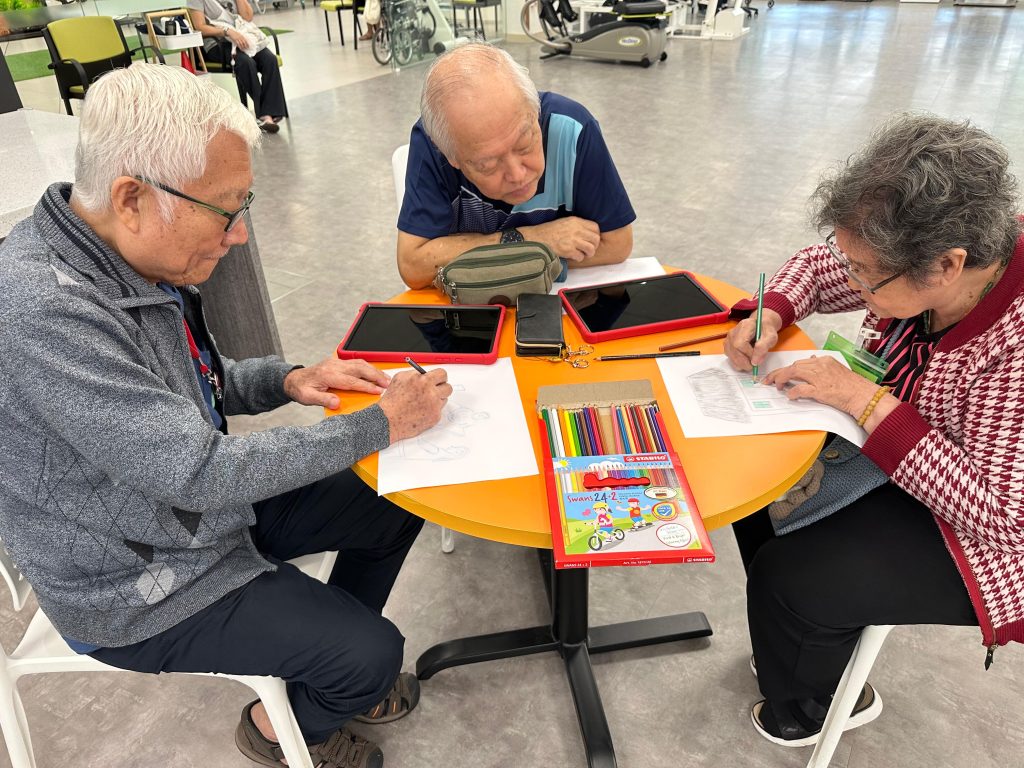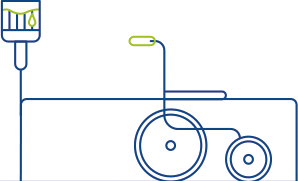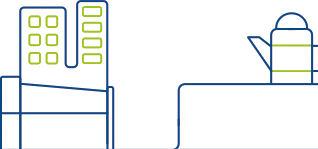St Luke’s ElderCare Taps Generative AI to Empower Elders to Author Their Life Stories & Leave a Legacy

Mdm Lian Swee Wah has always been a writer at heart, cherishing stories and the written word. However, at 85 years old, she faced challenges with the rapidly evolving world of technology, leaving her feeling disheartened. Her hope and confidence were renewed after going to St Luke’s ElderCare (SLEC) Active Ageing Centre (Care) @ Northshore. There, she learned to use generative artificial intelligence (AI) to author her personal life story, culminating in a printed book that now serves as a legacy.
Mdm Lian took part in the pilot SLEC Golden Memories programme, recently launched at SLEC Active Ageing Centre (Care) @ Northshore. Spanning eight weeks from April to June 2024 and involving 15 elders, this initiative represents one of SLEC’s innovative approaches to enhancing elder engagement and well-being.
Today, SLEC officially opened the SLEC Active Ageing Centre (Care) @ Northshore. It offers three-in-one services under one roof comprising day care, day rehabilitation, and active ageing. The event was officiated by Dr Janil Puthucheary, Senior Minister of State for Ministry of Digital Development and Information and Ministry of Health, and Adviser for Pasir Ris-Punggol GRC GROs.
Promoting Elders’ Well-being through Reminiscence Therapy
The new SLEC Active Ageing Centre (Care) @ Northshore, operational since September 2023, has been serving over 500 elders with day care services and active ageing programmes, and has treated over 160 rehabilitation clients to date. Beyond offering conventional active ageing activities such as outings, walks, baking, calligraphy, and dance sessions, the centre functions as a dynamic testing ground for innovative programmes that leverage technology to enhance and enrich the lives of its residents.
The SLEC Golden Memories programme empowers elders to document their life stories through a printed book and/or video. Participants reflect on significant life events and milestones, narrating their memories into a generative AI platform called MemoryLane, created by local entrepreneur Jason Tan. This platform then transforms their stories into personalised media formats such as books, audiobooks and AI-generated videos. At the end of the programme, each elder presents their life story and legacy to the group, providing an opportunity for shared experiences and mutual connection.
This programme functions as a powerful reminiscence therapy tool, providing numerous benefits for elders by helping them to:
- recollect and reflect on their past, reinforcing their sense of identity and self-worth;
- create a tangible personal legacy that can be cherished by their loved ones;
- embrace the fulfilment of a well-lived life and leave behind a legacy they can take pride in; and
- look beyond current challenges, including medical conditions, and celebrate their life journey.
Reminiscence therapy has long been a cornerstone of SLEC’s community care initiatives, complemented by projects such as elders’ life story scrapbooks and their recipe collections. However, the SLEC Golden Memories programme marks the first time that SLEC is harnessing technology and generative AI to enhance these efforts. The programme has been met with enthusiasm, with elders particularly delighted to see their names as authors in personalised books and to experience the visual and auditory elements of their life story videos.
The centre also features an Immersive Wall where elders’ artworks are transformed into dynamic digital displays. These vibrant digital versions of their art come to life on the wall, fostering interaction, conversation, and social connections, thereby enhancing the joy and lifting the mood of our residents. Additionally, the centre integrates Fitness Mirrors, virtual reality, and gamification into its activities and rehabilitation services, enriching the overall experience for the elders.
The centre boasts a “high tech, high touch” approach to eldercare. Adjunct Associate Professor (Dr) Kenny Tan, Chief Executive Officer of St Luke’s ElderCare said, “Technology is a powerful tool that can transcend traditional boundaries, exemplified by our use of generative AI to assist elders in crafting their personal autobiographies. We view technology as an enabler, but it must be paired with heartfelt execution to ensure that every elder is supported with warmth and effectiveness.”
Offering Holistic Service in the Northeast Region
SLEC is aligning its outreach strategy with the nation’s public healthcare system. This new centre will serve residents in the Northeast region, alongside four other centres at One Punggol, Rivervale and Sumang which also offer day care and day rehabilitation, and one centre in Anchorvale which offers day care, day rehabilitation and active ageing services.
An ecosystem of care goes beyond the location, infrastructure, and facilities. SLEC strives to build an ecosystem of care by encouraging collaborations and participation in elder care by other organisations and the community at large. Programmes and activities co-organised with other partners currently include “Kopi and Loti with You” programme with Sengkang General Hospital, baking sessions with Sengkang Methodist Church, and intergenerational exchanges with Carpe Diem Preschool, MyFirstSkool and M.Y World Preschool.
Bringing Advanced Robotics Therapy Closer to Home
Recognising the ever-evolving challenges of an ageing population, SLEC is reframing community care by combining hardware and heartware – to use advanced robotics and new technologies to uplift the lives of elders through a person-centred approach involving individualised care and meaningful programmes.
SLEC invested over $1.5 million to bring advanced robotics equipment, which has been largely exclusive to large hospitals into the community, closer to home. Apart from this new centre, SLEC has two other centres offering specialised robotics care. They are SLEC Day Rehabilitation Centre @ Bukit Batok, which opened in July this year, and Salem Centre in Yishun.
Robotics equipment enhances rehabilitation effectiveness with stimulation and precise movement support. It also offers an engaging experience through virtual reality and gamification elements. This approach addresses challenges such as discomfort during injury recovery, potential frustration from prolonged rehabilitation periods, and loss of interest in repetitive exercises. By integrating fun and game elements, elders remain motivated to actively participate and work steadily towards their recovery.
Moving Forward
Integrating technology is a key component of SLEC’s strategy to transform community care and support ageing in place. With the enthusiastic response from our elders at Northshore, SLEC will be progressively expanding the Golden Memories programme throughout Singapore. The programme, now spanning 6 weeks, is also being offered at two additional centres in Anchorvale and Bishan, enabling an additional 30 elders to document their legacies and create personal autobiographies. Additionally, to enhance services in the Northeast region, SLEC will open a new senior care centre in Fernvale and its second nursing home, SLEC Residence @ Punggol, offering 201 beds in 2025.
Looking ahead, SLEC is committed to deepening its collaborations with key partners, like the Singapore Institute of Technology (SIT) and Singapore Health Services (SingHealth), to enhance community care services. A Memorandum of Understanding (MoU) with SIT, signed in 2021, focuses on applied learning for students, staff training, and using SLEC facilities as industry teaching laboratories for research and innovation in community care. Additionally, SIT students will have opportunities for mentorship and involvement in collaborative projects, enhancing their practical experience in community care.
A new MoU with SingHealth, signed at the official opening of the SLEC Active Ageing Centre (Care) @ Northshore today, aims to enhance care coordination and transitions between acute and community care. The partnership includes joint training initiatives, health promotion programming, collaborative research, and quality improvement efforts to improve patient outcomes. This collaboration is pivotal in reshaping community care and strengthening the integration of health services in Singapore.



